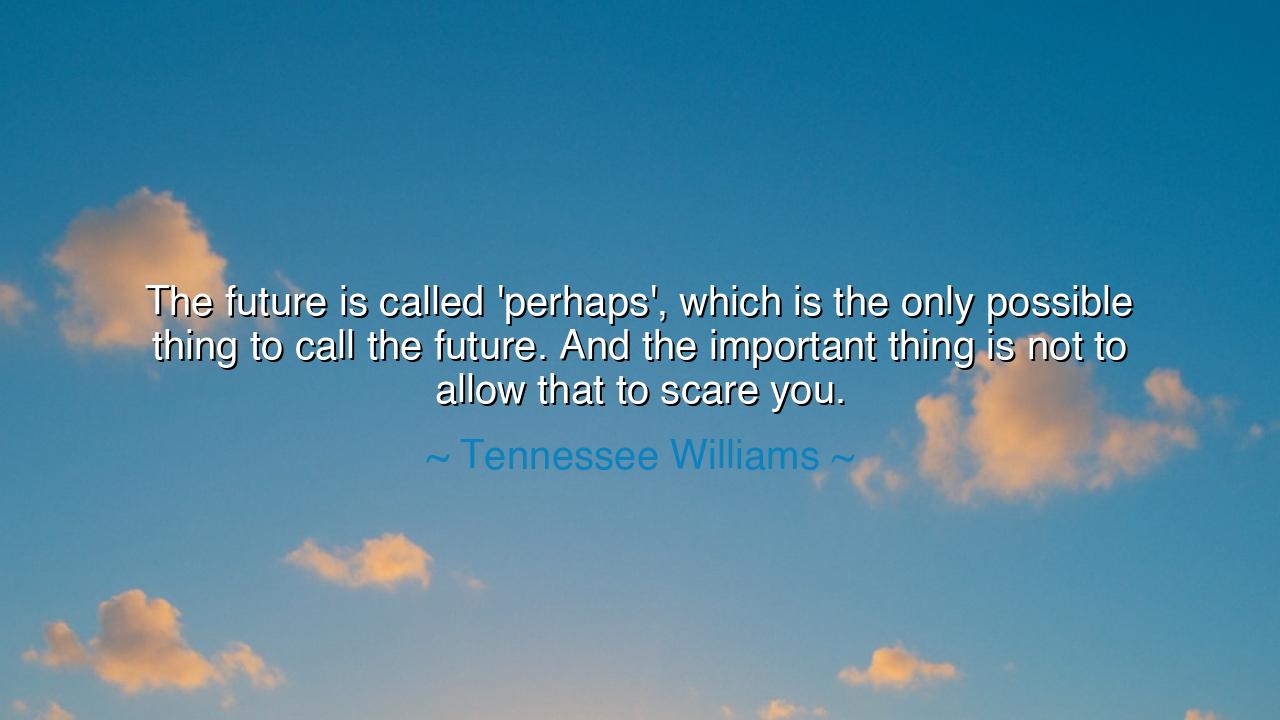
The future is called 'perhaps', which is the only possible thing
The future is called 'perhaps', which is the only possible thing to call the future. And the important thing is not to allow that to scare you.






"The future is called 'perhaps', which is the only possible thing to call the future. And the important thing is not to allow that to scare you." These words by Tennessee Williams reflect the uncertainty and mystery that surrounds the future. Perhaps is the only fitting term for what lies ahead, for it encapsulates the possibilities that the future holds—each choice, each turn, uncertain and unknown. Yet, Williams reminds us that while the future is unpredictable, it is not something to fear. Rather, we must embrace the uncertainty of the future as a blank canvas, a space in which we have the power to shape our lives with the choices we make today.
In the ancient world, the future was often seen as something both inaccessible and divinely ordained. The Greeks, with their belief in fate and destiny, understood the future as something shaped by the gods, often unpredictable and out of human control. Sophocles, in his famous play Oedipus Rex, explores the idea that no matter how much one tries to avoid fate, the future will arrive in its own time, often with unexpected consequences. The ancient Greeks did not view the future as something to fear, but something to accept with grace—for in their minds, it was a force that could not be resisted. They taught that the wisdom of the present was the key to navigating an uncertain future, choosing wisely and embracing whatever might come.
Similarly, the Romans, under the guidance of Stoic philosophers like Seneca and Marcus Aurelius, believed that the future was an unknown that could not be controlled. The Stoics taught that the only thing within our power was our response to external events. They embraced the uncertainty of the future, teaching us not to fear it, but to approach it with virtue and wisdom. Aurelius, in his Meditations, often spoke about the impermanence of life and the importance of accepting the unknown with equanimity, saying, "You could leave life right now. Let that determine what you do and say and think." For the Stoics, fear of the unknown was not a productive response—it was through living virtually, in accordance with nature and reason, that one could meet the future with calm assurance.
Williams’ "perhaps" calls attention to the idea that uncertainty is not something to be avoided, but something to be embraced. He reminds us that the future is not some predetermined script but a series of possibilities that are shaped by our choices. We may not know what will happen tomorrow, but we hold power in how we act today. This idea of embracing uncertainty and not fearing the unknown has been present throughout human history, in the great explorers, the innovators, and the visionaries who have shaped the course of civilization.
Take, for example, the life of Christopher Columbus, who dared to venture into the unknown in search of new lands. Columbus did not know what lay beyond the horizon, but his courage and faith in possibility drove him to sail westward, believing that there was something better waiting for him. Though his journey was fraught with uncertainty and danger, Columbus’ willingness to face the unknown opened the door to new worlds and new possibilities for humanity. His life teaches us that the future, though shrouded in "perhaps", is where opportunities are found for those brave enough to embrace it.
The lesson from Williams’ words is clear: while the future is uncertain and often out of our control, we must not allow that uncertainty to paralyze us with fear. The future is not something to be avoided or dreaded, but something to be explored, to be shaped by our choices, our actions, and our willingness to take risks. Like the ancients, we must embrace the uncertainty of life and meet it with strength, courage, and wisdom. For it is through uncertainty that we grow, learn, and discover the vast potential of the world around us.
In your own life, reflect on how uncertainty shapes your decisions. Are you paralyzed by the fear of what might happen, or are you willing to step into the unknown with faith in your ability to handle whatever comes? Embrace the future as an opportunity for growth, not something to be feared. By acting with courage and wisdom in the present, you can ensure that the future becomes a series of possibilities waiting to be explored. "Perhaps" is not a term of limitation, but a promise of potential—the future is a canvas that you alone can paint. Let go of fear, and embrace the unknown with open arms, knowing that it is your actions today that will shape the bright future ahead.






AAdministratorAdministrator
Welcome, honored guests. Please leave a comment, we will respond soon